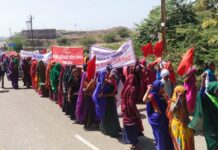The article was originally published in Telugu. Its translated into English by Nagargare Ramesh
The decision of the highest court of the land delivered on 7/02/2020 in a case relating to promotions in government jobs to the effect that reservations can not be claimed as a fundamental right while considering promotions to government employees and that the state governments cannot be directed by the courts of law to implement reservations for SCs and STs while promoting the employees has naturally led to a lot of discussion and debate in the country.
The parliament witnessed furore over the matter by the opposition parties and different parts of the country have witnessed protests and demonstrations against the verdict. The opposition parties as also the allies of the party in power at the centre are pressurizing the government to file a review petition in the Supreme Court or to include the issue of reservations in Schedule 9 of the Constitution so that it will be out of the purview of the judiciary. The Central government is merely saying that it is committed to the principle of reservations but has not come out with any specific plan of action in this regard. As such, there is a need for a more detailed and in-depth discussion of the issue in political circles as well as the general public.
The highest court was examining the verdict of the Uttarakhand high court in a case relating to the implementation of the reservation policy while promoting employees from scheduled caste and tribe categories. The Uttarakhand court was in favour of following reservations while effecting promotions and the Supreme Court has nullified that decision. The Uttarakhand government had , in a notification , announced that reservation policy need not be implemented while promoting assistant engineers in Public Works Department . It was questioned in the highcourt of the state and the court ordered that the state government should collect statistics about the representation of the SCs and STs in the said posts and if it is found that their representation is not proportionate to their population the government was bound to promote employees of the two said categories.. This decision was questioned in the Supreme Court and the bench consisting of Justice L Nageswara Rao and Justice Hemanth Gupta have nullified the decision of the high court of Uttarakhand.
The following are the salient aspects of the Supreme Court Verdict.
A) Reservations in promotions are not a fundamental right,
B) Courts of law cannot direct the state governments to implement reservation policy for SCs and STs,
C) The governments are at liberty to implement the policy of reservations or not to implement. If they decide to implement the policy they have to first collect details of the representation of different sections of the society in government jobs,
D) If the government does not intend to implement the policy in respect of any group it is not necessary to collect such details,
E) Even if such statistics are available, the courts of law can not direct the governments to implement the policy.
The verdict of the court is unambiguous, but the question to be examined now is whether it is in conformity with or violative of the objectives of the Constitution.
The original case was about whether reservation policy should be followed in matters of promotions. The 2012 notification of the government of Uttarakhand, the verdict of the high court of the state and the nullification of the high court verdict by the Supreme Court all relate only to that specific aspect. But the problem has arisen because the verdict of the Supreme Court also pronounces that reservations per se, whether in recruitment or in promotions, are not a fundamental right.
It is to be noted that if the Court had opined that reservations are a fundamental right of the socially disadvantaged sections it would have decided that in matters of promotions too, reservations are a fundamental right subject to certain restrictions. To decide whether reservations are a fundamental right are not in promotions it has to be first decided whether it is a fundamental right or not of the socially disadvantaged sections of society. The policy that applies to recruitments is also applicable to promotions. It is for that reason that the Court decided to settle the question of reservations as such. Only so, though the case pertains only to reservations in promotions the Court has taken up a discussion about the issue in the prelude to the judgment.
While stating that reservations are not a fundamental right, the Court has left the decision to implement the policy of reservations to the discretion of the government and that such a decision should be based on the statistics pertaining to the representation of different sections of society in government jobs. It can be argued that if a particular section is found to be not disadvantaged that section could be placed outside the ambit of reservations. But the contradiction lies in the fact that it is not mandatory for the governments to extend the benefit of reservations to a specific section even when found to be backward according to the findings. But if the government decides to extend the facility to any section the decision should be backed by statistics to prove its backwardness. On the face of it might appear that a section that is no more backward need not be considered for reservation of jobs since it will result in a form injustice to other sections But when it is said that reservations as such are not a fundamental right and that even in the presence of statistics to prove the backwardness of a particular section of the society the government need not implement the policy of reservations, it raises several questions. It is surprising that the Court has found it fit to come out with such an important decision with far-reaching impact without examining the issue more deeply. The Court merely cites some cases like Suresh Chand Gowtham, 2016 to substantiate its position. Several objections raised by seniors advocates like Colin Gonsalves, Dushyanth Dave and Kapil Sibal to the earlier cases cited by the Court, in this case, were totally ignored.
The Preamble of the Constitution states that we the peole of India give unto ourselves the Constitution to achieve justice political, economic and social. The emphasis is not merely on equality but also on equality of opportunities, which calls upon the governments to pay special attention to those sections deprived historically of privileges. Justice Chinnapa Reddy calls it positive discrimination in his report on backward classes .He explains that it is not discrimination against any one but a progressive discrimination to remove a historical injustice .Resolving the issues of inequality is a social compulsion and reservations are made part of the Constitution by the makers of the Constitution with a view to rid the society of such inequalities. But glaringly, not just the people, but even the Courts of Law are oblivious of this progressive vision of the Constitution.
The said verdict refers to clause 4 and clause 4/A of article 16, but out of context. Articles 12 to 35 of the Constitution speak of the fundamental rights . Articles 14, 15 and 16 are about right to equality, right to protection against discrimination and right to reservations in educational institutions and in jobs. They are all part of Part 3 of the Constitution. Such being the case one wonders how reservations cannot be considered a fundamental right and the judgment does not care to explain its position when it says that reservations are not a fundamental right. All the provisions in articles 14, 15, and 16 and all the articles in Part 3 of the Constitution are all fundamental rights. These rights are of two types. Freedom of speech and expression, to assemble and the like are the ones about which the governments need not do anything, except honouring those rights. But the rights of the second variety, like right to equality, and to equal opportunities require the governments to take necessary measures to implement them and ensure that they are realised. The government thus is responsible for the human rights of the citizens. Only in respect of the Directive Principles of state policy contained in Part 4 of the Constitution the government nned not take any measures and the same cannot be question in the court of law. But the government has no such luxury in the case of the fundamental rights; it has to strive to implement them.
The verdict in question states that clause 16/4 and 4/A are directions to the governments , and that if the government decides to extend the facility of reservations to any section of the society these clause merely empower them to do so. Hence they are there only to vest certain powers with the government and not to direct the government… But the fact is that through these clauses the governments are empowered to create reservation facilities but not to deny them to any section in need. It is strange how the Court could construe this provision only as one giving discretionary powers to the government. One fails to understand how the Court has so easily given up its power to direct the government to take certain measures. Besides, this judgment also disturbs the balance achieved in the Constitution in matters of distribution of powers among different organs of the government and what is more, it invalidates the very concept of social justice.
Talking of reservations in promotions, different sections have to be extended this facility in different cadres based on their representation in those cadres. As one moves up the hierarchy representation of certain disadvantaged sections tends to be less and less and the statistics in Uttarakhand has proved this fact. Then there is an other more important and more problematic issue and that is that of creamy layer.. To solve this, candidates from those sections using the facility for the first time should be given preference and if there are vacancies still available other candidates from the same category should be considered. Such a policy will be in accordance with the aim and spirit of the reservation policy and every one belonging to those sections will appreciate the measure and will not grouse the facility given to the less privileged in one’s own community. The concept of the creamy layer should be subjected to a more detailed discussion instead of being thought of as one that is to be done away with. And that asks for a thorough analysis.
The writer is a member of All India Forum of Right to Education( AIFRTE). Views are personal.




























